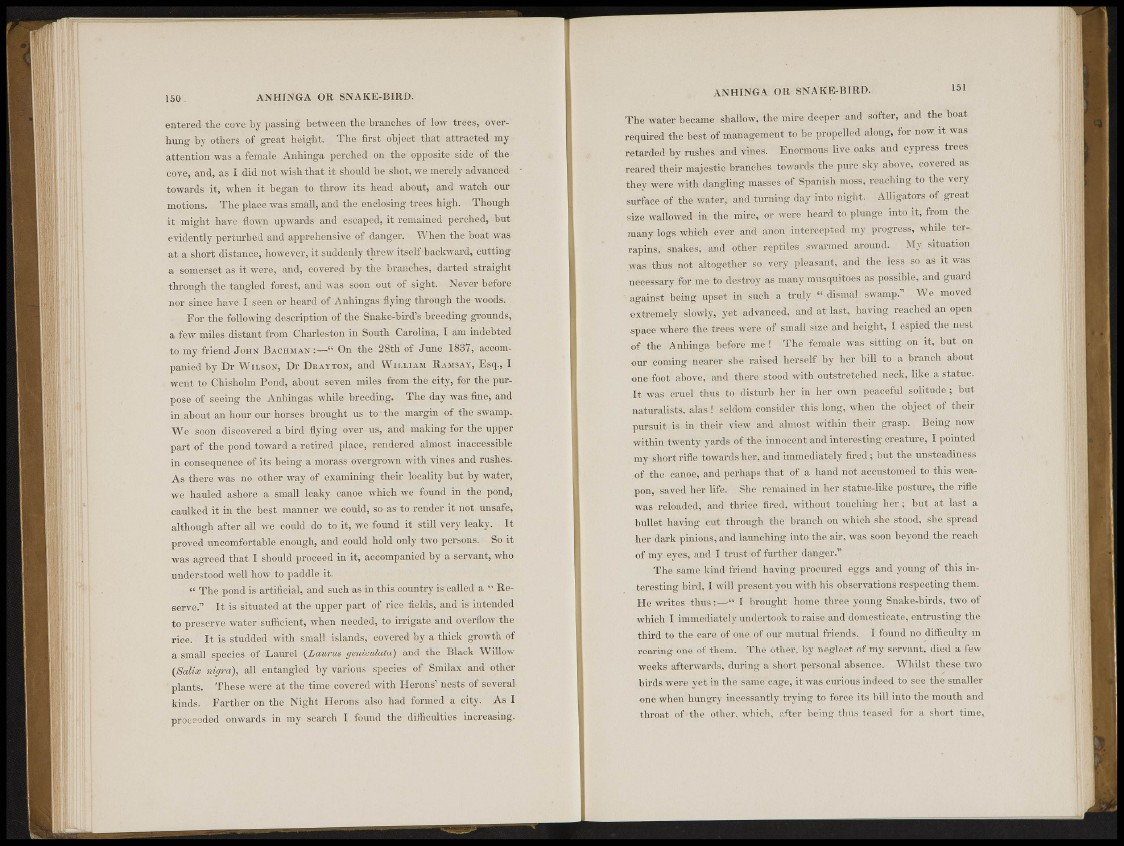
150 ANHINGA OR SNAKE-BIRD.
catered tho efivftiaj passing between the-branches of low ,txeeç, -overhung
by ethers. (if great'height. The first object that attracted my
attention'was a female Anhinga perched OH the opposite side of the
(•ove, and, as 1 did not wish that it should be slid, >ve merely advanced
towards it, when it began to throw its head about, and watch our
motions. The place was .small, and the enclosing trees high. Though
it might have flown upwards and- escaped', it remained perched, but
evidently perturbed and,apprehensive of danger. When the boat was'
at a short distance, however, it&uddenly threw itself-backward, cutting
a somerset as it were, and, covered by the branches, darted straight
through the tangled forest, and was- soon out of sight. Never before
nor since have I seen or heiird.of Anhingas flying through the Woods;
For the following description of the Si.uko bird's breeding grounds,
aftfwmiles distant from Charleston in Sooth: Carolina, I am indebted
to my friend Jons' Bacumax :—" On the.28th of June
paniod by Dr Wn.sos, Dr DeaStok, and William Ramsay, Esq., I
went to Chisholm Pond,'about , seven miles from tho city, for the purpose
of seeing the Anhingas while, breeding.-. .The day was fine, and
in .about an hour our horses brought us to'jthe margin of the swamp.
We soon discovered «.bird flying .over^i, and mating for the upper
part of tin: pond toward â retired place, rendered almost inaccessible
in consequence of:its being a morass overgrown with vin)« and rushes.
As there was no other, way of oxaRiitiiniMhoir locality but by water,
we hauled ashore a small leaky canoe .wJjJeh we found in the pond,
caulked it in the; b.«t manner we could, 'So.fts to render it not unsafe,
although after all we could do to it, we found it still very .leaky- -It
proved uncomfortable enough, and could hold Zmly two persons. So it
was agreed that I should proceed in it, accompanied by a sonant, who
understood well how' to paddle it.
" The pond is: artificial, and as in this wiintry iff called a " Reserve,"
It is: saj^rtéS a ï the upper part of rien-plds, and is intended
to preserye water-sufficient, when needed, to irrigate and overflow .the
rice. : It is si added with small islands,, covered by a thick growth of
a small species of Laurel (Laurvs yenioulata) and the Black Willow
(SaJix nigra), all entangled by varaous' species of Smilax and'other
' planté. These wore at the time covercd with Herons' ftftsts of several
kinds. Farther fin the Night Herons also: had formed a city. As I
proceeded onwards in my search I found the difficulties ' increasing.
ANHINGA OR SNAKE-BIRD. 151
The water became shallow, the mire deeper and softer,:
and the boat
required the b.<*t;of management to bo propelled along, f<»r now it was
retarded by rushes and, vines. Enormous live oaks and cypress trees
reared their majestic branches towards the pure sky above, covered as
they were with dangling mioses of Spanish moss, reaching to the very
surface of the water,, and turning day into night. Alligators of .great
size wallowed in the mmv ú r ^ r " b.-ard to plunge into it, from the,
many logs which ever and anon intercepted my progress, while terrapins,.
snakes, and other reptiles .swarmed around. My situation
was -thus not altogether so very,,pleasant, and the less .so as it was
necessary for me-to destroy as many musquitoos as possible, and guard
-against being upset in such a truly " dismal swamp." We moved
extremely ;slowly, yet advanced,: apd a t last, having reached an open
space where the trees xu-rt: of Small size' arid height, I espied the nest
of the Anhinga before me I The female was sitting, op 'it, but .on
our coming nearer she raised herself by her bill to a branch about
one foot, above,: and there .stood with outstretched .neck, like a statue.
It was cruel thus to: disturb her in her own peaceful solitude ; but
naturalists,>afes ! seldom consider this long, when the'object of their
pursuit- is in. their view.- ami almost within their grasp. Being now
within twenty yards of the. innocent and interesting creature, I pointed
my short rifle towards Iter, and immediately fired; but the unsteadiness
of • the. canoe, and perhaps that' of ft hand not accustomed to this weapon,
saved her life. She „remained in her statue-like posture,Kg ¡rifle
was reloaded, and thrice- fired, without touching her; but at last a
bullet having cut through the branch on which she stood, she spread
her dark pinions, and launching into the air, was soon beyond the reach
of my eyes, and I trust-of further danger."
The same kind friend lmvintf procured eggs and young of this interestitig1
bird, I will present you with his observations respecting them.
He writes thus:—" I brought home three young Snake-birds, two.of
which I immediately undertook to raise, and domesticate, entrusting the
third to the eare fif finé of our mutual friends. I found no difficulty in
rearing, one of them. The other, by neglect of my-servant, died a few
weeks afterwards, during a short personal absence. Whilst these two
birds were yet in the same cage, it was curious indeed to see the smaller
one when hungry incessantly trying to force its bill into the mouth and
throat of' the other, which, after being thus teased for a short time,